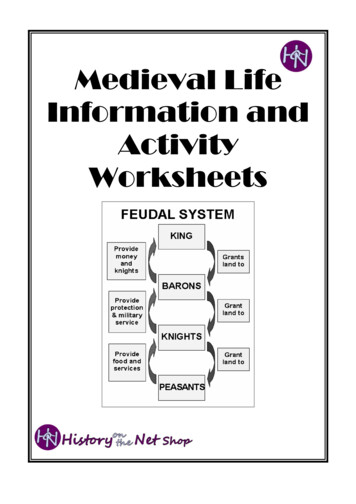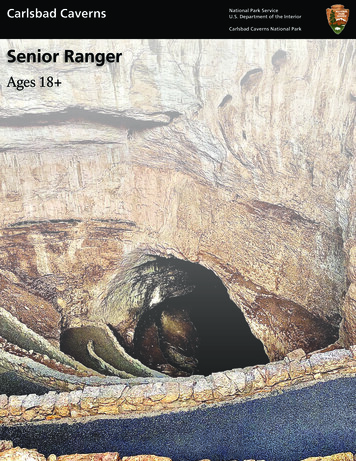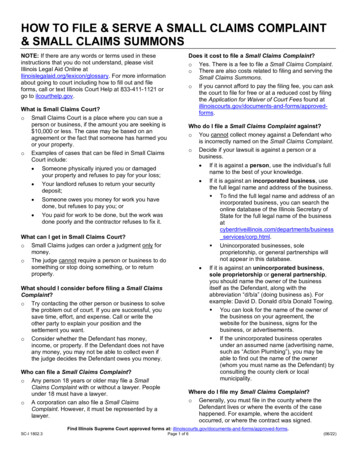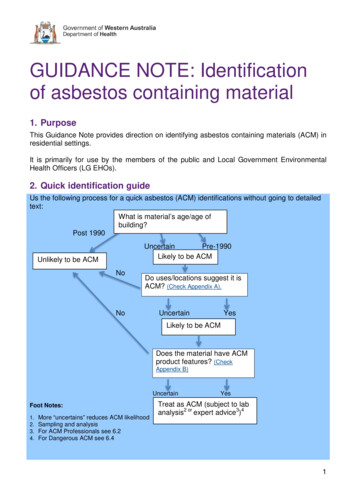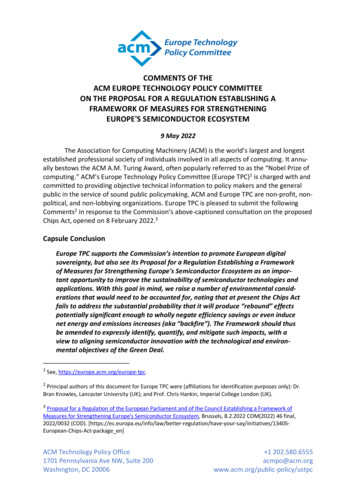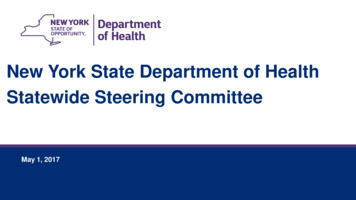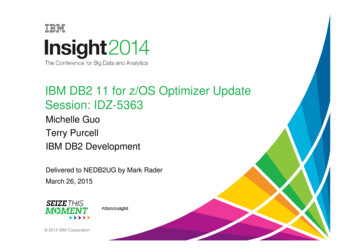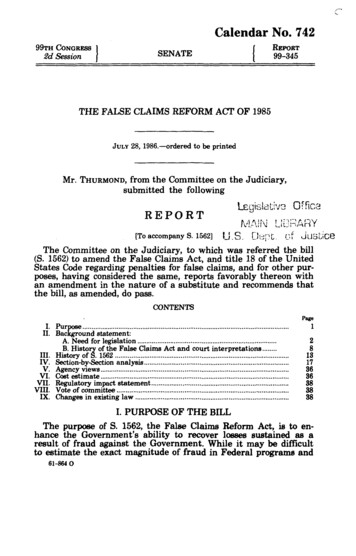
Transcription
Calendar No.74299TH CONGRESS2d SessionREPORTSENATE99-345THE FALSE CLAIMS REFORM ACTOF1985JULY 28, 1986.—ordered to be printedMr. THURMOND, from the Committee on the Judiciary,submitted the followingREPORTLegislativeOfficeMAIN LIBRARY[To accompany S. 1562]U.S.Dept.ofJusticeThe Committee on the Judiciary, to which was referred the bill(S. 1562)to amend the False Claims Act, and title 18 of the UnitedStates Code regarding penalties for false claims, and for other pur poses, having considered the same, reports favorably thereon withan amendment in the nature of a substitute and recommends thatthe bill, as amended, do pass.CONTENTSPageI. PurposeII. Background statement:A. Need for legislationB. History of the False Claims Act and court interpretationsIII. History of S. 1562IV. Section-by-Section analysisV. Agency viewsVI. Cost estimateVII. Regulatory impact statementVIII. Vote of committeeIX. Changes in existing law12813173636383838I. PURPOSE OF THE BILLThe purpose of S. 1562, the False Claims Reform Act, is to en hance the Government's ability to recover losses sustained as aresult of fraud against the Government. While it may be difficultto estimate the exact magnitude of fraud in Federal programs and61-864 O
2procurement, the recent proliferation of cases among some of thelargest Government contractors indicates that the problem issevere. This growing pervasiveness of fraud necessitates moderniza tion of the Government's primary litigative tool for combattingfraud; the False Claims Act (31 U.S.C. 3729, 3730). The main por tions of the act have not been amended in any substantial respectsince signed into law in 1863. In order to make the statute a moreuseful tool against fraud in modern times, the Committee believesthe statute should be amended in several significant respects.The proposed legislation seeks not only to provide the Govern ment's law enforcers with more effective tools, but to encourageany individual knowing of Government fraud to bring that infor mation forward. In the face of sophisticated and widespread fraud,the Committee believes only a coordinated effort of both the Gov ernment and the citizenry will decrease this wave of defraudingpublic funds. S. 1562 increases incentives, financial and otherwise,for private individuals to bring suits on behalf of the Government.The False Claims Reform Act also modernizes jurisdiction andvenue provisions, increases recoverable damages, raises civil forfeit ure and criminal penalties, defines the mental element required fora successful prosecution and clarifies the burden of proof in civilfalse claims actions.II. BACKGROUND STATEMENTA. NEED FOR LEGISLATIONEvidence of fraud in Government programs and procurement ison a steady rise. In 1984, the Department of Defense conducted2,311 fraud investigations, up 30 percent from 1982. Similarly, theDepartment of Health and Human Services has nearly tripled thenumber of entitlement program fraud cases referred for prosecu tion over the past 3 years.Detected fraud is, of course, an imprecise measure of how muchactual fraud exists. The General Accounting Office in a 1981 studyfound that "most fraud goes undetected." 1 Of the fraud that is de tected, the study states, the Government prosecutes and recoversits money in only a small percentage of cases.Fraud permeates generally all Government programs rangingfrom welfare and food stamps benefits, to multibillion dollar de 2fense procurements, to crop subsidies and disaster relief programs.While fraud is obviously not limited to any one Governmentagency, defense procurement fraud has received heightened atten tion over the past few years. In 1985, the Department of DefenseInspector General, Joseph Sherick, testified that 45 of the 100 larg est defense contractors, including 9 of thetop 10, were under inves tigation for multiple fraud offenses.3 Additionally, the JusticeDepartment has reported that in the last year, four of the largestdefense contractors, General Electric, GTE, Rockwell and Gould,1GAO Report to Congress, "Fraud in Government Programs: How Extensive is it? How Can itbe Controlled?", 1981.2See Id. at 8-15.3Hearings on Federal Securities Laws and Defense Contracting before the Subcommittee onOversight and Investigations of the Committee on Energy and Commerce, House of Representa tives, 99th Congress, 1st session (1985).
3have been convicted of criminal offenses whileanother, GeneralDynamics, has been indicted and awaits trial.4No one knows, of course, exactly how much public money is lostto fraud. Estimates from those who have studied the issue, includ ing the General Accounting Office, Department of Justice, and In spectors General, range from hundreds of millions of dollars tomore than 50 billion per year.The 1981 GAO report on fraud estimated that loss to the Govern ment from 77,000 reported cases over 21/2years would total between 150 and 200 million. But the report went on to note:These losses are only what is attributable to knownfraud and other illegal activities investigated by the Feder al agencies in this study. It does not include, of course, thecost of undetected fraud which is probably much higherbecause weak internal controls allow fraud to flourish.5The Department of Justice has estimated fraud as draining 1 to10 percent of the entire Federal budget.6 Taking into account thespending level in 1985 of nearly 1 trillion, fraud against the Gov ernment could be costing taxpayers anywhere from 10 to 100 bil lion annually.In the Defense Department procurement budget alone, we maybe losing anywhere from 1 to 10 billion if the Justice Departmentestimate is accurate. Defense Department Inspector GeneralJoseph Sherick estimated that DODloses more than 1 billion justfrom fraudulent billing practices.7The cost of fraud cannot always be measured in dollars andcents, however. GAO pointed out in its 1981 report that frauderodes public confidence in the Government's ability to efficientlyand effectively manage its programs.8 Even in the cases wherethere is no dollar loss—for example where a defense contractor cer tifies an untested part for quality yet there are no apparent de fects—the integrity of quality requirements in procurement programs is seriously undermined. A more dangerous scenerio existswhere in the above example the part is defective and causes notonly a serious threat to human life, but also to national security.Fraud is perhaps so pervasive and, therefore, costly to the Gov ernment due to a lack of deterrence. GAO concluded in its 1981study that most fraud goes undetected due to the failure of Governmental agencies to effectively ensure accountability on the part ofprogram recipients and Government contractors. The study states:For those who are caught committing fraud, the chancesof being prosecuted and eventually going to jail areslim . . . The sad truthis that crime against the Govern ment often does pay.94Hearings on White Collar Crime before the Senate Committee on the Judiciary, 99th Con gress, 2d session (1985).5GAO Report, at 1.8Hearings on the Departments of State, Justice and Commerce before the Subcommittee onthe Departments of State, Justice and Commerce, the Judiciary and Related Agencies of theHouse Committee on Appropriations, 96th Congress, 2d session (1980).7Hearings on Federal Securities Laws and Defense Contracting before the Subcommittee onOversight and Investigations of the Committee on Energy and Commerce, House of Representa tives, 99th Congress, 1st session (1985).8GAO Report, at 19.9GAO Report, at cover.
4Many changes have been made since 1981 which have broughtabout some encouraging improvements in the Government's effortsagainst fraud. With the inception of Inspectors General, an increased number of fraud allegations are being addressed. However,available Department of Justice records show most fraud referralsremain unprosecuted and lost public funds, therefore, remain uncollected.10In 1984, the Economic Crime Council of the Department of Jus tice targeted two major Federal programs—defense procurementand health care benefits—as economic crime areas in which strong er enforcement and deterrence were needed. In the Council's April,1985 report to the Attorney General, it concluded that while someprogress had been made, the level of enforcement in defense pro curement fraud remains inadequate.11Through hearings and research on Government fraud, the Com mittee has sought and is continuing to seek out the reasons whyfraud in Government programs is so pervasive yet seldom detectedand rarely prosecuted. It appears there are serious roadblocks toobtaining information as well as weaknesses in both investigativeand litigative tools. In an effort to correct some of those weak nesses, the Committee has reviewed the Government's remediesagainst false claims and developed the legislative improvementsembodied in S. 1562.The False Claims Act currently permits the United States to recover double damages plus 2,000 for each false or fraudulentclaim. Enacted in 1863 in response to cases of contractor fraud per petrated on the Union Army during the Civil War, this statute hasbeen used more than any other in defending the Federal treasuryagainst unscrupulous contractors and grantees. Although the Gov ernment may also pursue common law contract remedies, the FalseClaims Act is a much more powerful tool in deterring fraud.Since the act was last amended in 1943, several restrictive courtinterpretations of the act have emerged which tend to thwart theeffectiveness of the statute. The Committee's amendments con tained in S. 1562 are aimed at correcting restrictive interpretationsof the act's liability standard, burden of proof, qui tam jurisdictionand other provisions in order to make the False Claims Act a moreeffective weapon against Government fraud.Detecting fraud is usually very difficult without the cooperationof individuals who are either close observers or otherwise involvedin the fraudulent activity. Yet in the area of Government fraud,there appears to be a great unwillingness to expose illegalities.In 1983, the U.S. Merit Systems Protection Board conducted asurvey of approximately 5,000 Federal Government employees todetermine to what extent observed fraud, waste, and abuse wasgoing unreported. The Merit Systems Board reported that 69 percent of those who believed they had direct knowledge of illegalitiesfailed to report the information. Those employees who chose not toreport fraud were then asked why they failed to come forward. The10Department of Justice Civil Division records show 2,850 fraud referrals in fiscal year 1984and just 21 complaints filed and 70 settlements or judgments. In fiscal year 1985, the Divisionreceived2,734 fraud referrals, filed 36 complaints and obtained 54 settlements or judgments.11Report of the Economic Crime Council to the Attorney General, "Investigation and Pros ecution of Fraud in Defense Procurement and Health Care Benefits Programs", April 30, 1985.
5most frequently cited reason given (53 percent) was the belief thatnothing would be done to correct the activity even if reported. Fearof reprisalwas the second most cited reason (37 percent) for nonreporting.12In hearings before the Subcommittee on Administrative Practiceand Procedure, individuals who had "blown the whistle" on theirGovernment contractor employers offered several reasons for whatone termed the "conspiracy of silence" among contractor employees. 13Robert Wityczak, a triple-amputee veteran who exposed mis charging practices at Rockwell International, said his "ethical prin ciples" were tested to the limit when faced with the difficult choiceof either keeping quiet about mischarging he witnessed or riskingthe loss of his job.I agonized over my decision to step forward. I have awife, five children and a house mortgage * * * Yet once Imade the decision to tell the truth about what was goingon, I found no one insideor outside the company willing toact on the information.14Wityczak said his initial efforts to report the mischarging startedwhat was to result in a long-term harassment campaign by his su periors which finally resulted in Wityczak being discharged.Wityczak said:I told my supervisors * * * I would no longer mischargeon my time cards. They reacted angrily, calling me antimanagement, anti-Rockwell, and a pain in the ass * * *Gradually, I was squeezed out of the work I was doing. Iwas stripped of my confidential security, my access to doc uments was limited, I was excluded from meetings andwas put to work doing menial tasks outside my job descrip tion, such as sweeping,making coffee and cleaning a 50gallon coffee pot.15Wityczak said he has concluded not only from his own experi ence but from talking to his fellow workers that there is "absolute ly no encouragement or incentive" for individuals working in thedefense industry to report fraud. Instead, he said, there is a greatdisincentive due to employer harassment and retaliation. "Contrac tor employees are generally all for exposing fraud, but most indi viduals just simply cannot andwill not put their head on the chopping block," Wityczak said.16Wityczak's comments were echoed by Mr. John Gravitt, anotherwitness who testified in regard to time card mischarging at a Gen eral Electric plant in Ohio. Gravitt agreed that most individualsworking in defense contractor plants are afraid to expose fraud.Gravitt also pointed out that without cooperating employees, Gov12"Blowing the Whistle in the Federal Government", Report of the United States Merit Sys temsProtection Board, Oct. 1984.13Hearing on S. 1562, the False Claims Reform Act, before the Subcommittee on Administra tive Practice and Procedure of the Senate Committee on the Judiciary, 99th Congress, 1st ses sion,September 17, 1985.14Id. at 80.15Id. at 81.16Id. at 85.
6ernment auditors would rarely detect abuses. Gravitt explainedthat notice of an impending audit normally travels through thecontractor plant "like wildfire" and "everybody straightens uptheir act." Wityczak said his experience with Government auditswas similar in that all departments were put on "red alert" whenauditors came through. 17The Committee believes changes are necessary to halt the socalled "conspiracy of silence" that has allowed fraud against theGovernment to flourish. John Phillips, co-director of the Center forLaw in the Public Interest, a nonprofit law firm specializing in as sisting "whistleblowers", testified that more effective fraud detec tion will only occur if changes are made at the basic employeelevel. Phillips said people who are unwilling participants in fraudu lent activity must be given an opportunity to speak up and takeaction without 18fear and with some assurance their disclosures willlead to results.Hearing testimony also suggested that the collection of informa tion which leads to successful fraud recoveries is hampered by theGovernment's inadequate investigative tools. Justice Departmentwitnesses stated that as in all complex white-collar fraud matters,investigative tools are critical to successful prosecutions. Mr. JayStephens, Associate Deputy Attorney General, testified that in civilfalse claims cases the Department's civil attorneys rely in largepart on FBI reportsand information gathered by the various In spectors General,19 but that civil investigative capacity is oftenhampered, however, in two ways. First, the civil attorneys themselves have no authority to compel production of documents ordepositions prior to filing suit. Currently, some cases are weededout and not filed because information is missing—information thatmight have turned up through pre-suit investigation if the toolswere available.20Second, information is often incomplete due to the existence of aprior grand jury investigation resulting in evidence protected byRule 6(e) of the Federal Rules of Criminal Procedure. On June 30,1983, the Supreme Court ruled in United States v. Sells Engineer ing, Inc., 103 S. Ct. 3133 (1983), that Department of Justice attor neys handling civil cases are not "attorneys for the government"for the purposes of Rule 6(e) of the Federal Rules of Criminal Pro cedure. Therefore, they may not obtain grand jury materials thatpertain to their cases without a court order; and such an order maybe granted only upon a showing of "particularized need." The courtfurther held that the "particularized need" standard was not satis fied by a showing that nondisclosure would cause lengthy delays inlitigation or would require substantial duplication of an investiga tion already conducted by the Government using scarce investiga tive and audit resources.Compounding the investigative problems are also various litiga tive hurdles. As a civil remedy designed to make the Governmentwhole for fraud losses, the civil False Claims Act currently pro17181920Id.Id.Id.Id.at 82.at 87.at 39.at 39.
7vides that the Government need only prove that the defendantknowingly submitted a false claim. However, this standard hasbeen construed by some courts to require that the Governmentprove the defendant had actual knowledge of fraud, and even to es tablish21that the defendant had specific intent to submit the falseclaim, for example, United States v. Aerodex, Inc., 469 F.2d 1003(5th Cir. 1972). The Committee believes this standard is inappropri ate in a civil remedy and presently prohibits the filing of manycivil actions to recover taxpayer funds lost to fraud.The Committee's interest is not only to adopt a more uniformstandard, but a more appropriate standard for remedial actions.Currently, in judicial districts observing an "actual knowledge"standard, the Government is unable to hold responsible those cor porate officers who insulate themselves from knowledge of falseclaims submitted by lower-level subordinates. This "ostrich-like"conduct which can occur in large corporations poses insurmount able difficulties for civil false claims recoveries.The Committee is firm in its intention that the act not punishhonest mistakes or incorrect claims submitted through mere negli gence. But the Committee does believe the civil False Claims Actshould recognize that those doing business with the Governmenthave an obligation to make a limited inquiry to ensure the claimsthey submit are accurate.The burden of proof in civil false claims cases has also evolvedthrough caselaw into an ambiguous standard. Some courts have re quired that the United States prove a violation by clear and con vincing, or even clear, unequivocal and convincing evidence, UnitedStates v. Ueber,299 F.2d 310 (6th Cir. 1962), which the Justice De partment has testified is the "functional equivalent of a criminalstandard." 22In addition to detection, investigative and litigative problemswhich permit fraud to go unaddressed, perhaps the most seriousproblem plaguing effective enforcement is a lack of resources onthe part of Federal enforcement agencies. Unlike most other typesof crimes or abuses, fraud against the Federal Government can bepoliced by only one body—the Federal Government. State and locallaw enforcement are normally without jurisdiction where Federalfunds are involved.Taking into consideration the vast amounts of Federal dollars devoted to various complex and highly regulated assistance and pro curement programs, Federal auditors, investigators, and attorneysare forcedto make "screening" decisions based on resource factors. 23 Allegations that perhaps could develop into very significantcases are often left unaddressed at the outset due to a judgmentthat devoting scarce resources to a questionable case may not beefficient. And with current budgetary constraints, it is unlikelythat the Government's corps of individuals assigned to anti-fraudenforcement will substantially increase.21Id. at 34.Id. a t 35.Hearings on Defense Procurement Fraud Law Enforcement before t h e Subcommittee onAdministrative Practice a n d Procedure of t h e S e n a t e Committee on the Judiciary, 99th Con gress, 1st session (1985).2223
8An additional problem noted by hearing witnesses, exists whenlarge, profitable corporations are the subject of a fraud investiga tion and able to devote many times the manpower and resourcesavailable to the Government. This resource mismatch was recog nized by DOD Inspector General Joseph Sherick who said that infar too many instances the Government's enforcement team isovermatched by the legal teams major contractors retain. 24The Committee believes that the amendments in S. 1562 whichallow and encourage assistance from the private citizenry canmake a significant impact on bolstering the Government's fraudenforcement effort. The idea of private citizen aid in false claimsactions is, of course, not a new one, but dates back to the originalenactment of the False Claims Act in 1863. Additionally, in otherareas of enforcement such as antitrust and securities violations,the number of private enforcement actions far exceeds thosebrought by the Government.25B. HISTORY OF THE FALSE CLAIMS ACT AND COURT INTERPRETATIONSThe False Claims Act was adopted in 1863 and signed into law byPresident Abraham Lincoln in order to combat rampant fraud inCivil War defense contracts. Originally the act provided for bothcivil and criminal penalties assessed against one who was found toknowingly have submitted a false claim to the Government. Thecivil penalty provided for payment of double the amount of damages suffered by the United States as a result of the false claim,plus a 2,000 forfeiture for each claim submitted.In its present form, the False Claims Act empowers the UnitedStates to recover double damages from those who make, or cause tobe made, false claims for money or property upon the UnitedStates, or who submit false information in support of claims. In ad dition the United States may recover one 2,000 forfeiture for eachfalse claim submitted in support of a claim. The imposition of thisforfeiture is automatic and mandatory for each claim which isfound to be false. The United States is entitled to recover such for feitures solely upon proof that false claims were made, withoutproof of any damages. Fleming v. United States, 336 F.2d 475, 480(10th Cir. 1964), cert. denied, 380 U.S. 907 (1965). A forfeiture maybe recovered from one who submits a false claim though no pay ments were made on the claim. United States v. American Preci sion Products Corp., 115 F. Supp. 823 (D. N.J. 1953). The FalseClaims Act reaches all parties who may submit false claims. Theterm "person" is used in its broad sense to include partnerships,associations, and corporations—United States v. Hanger One, Inc.,563 F.2d 1155, 1158 (5th Cir. 1977); United States v. NationalWholesalers, Inc., 236 F.2d 944 (9th Cir. 1956)—as well as Statesand political subdivisions thereof. Cf. Ohio v. Helvering, 292 U.S.360, 370 (1934); Georgia v. Evans, 316 U.S. 153, 161 (1942); Monell v.Department of Social Services of the City of New York, 436 U.S. 658(1978).2425431Id. at 18.See United States Department of Justice Source Book of Criminal Justice Statistics, 1981 at
9The False Claims Act is intended to reach all fraudulent attempts to cause the Government to pay out sums of money or todeliver property or services. Accordingly, a false claim may takemany forms, the most common being a claim for goods or servicesnot provided, or provided in violation of contract terms, specifica tion, statute, or regulation. For example, United States v. Bornstein, 423 U.S. 303 (1976); United States v. National Wholesalers,236 F.2d 944 (9th Cir. 1956), cert. denied, 353 U.S. 930 (1957); Henryv. United States, 424 F.2d 677 (5th Cir. 1970). A false claim for re imbursement under the Medicare, Medicaid or similar program isactionable under the act, Peterson v. Weinberger, supra, as is a falseapplication for a loan from a Government agency, United States v.Neifert-White Co.,390 U.S. 228 (1968), or a false claim in connectionwith a sale financed by the Agency for International Developmentor Export-Import Bank, United States v. Chew, 546 F.2d 309 (9thCir. 1978), and such claims may be false even though the servicesare provided as claimed if, for example, the claimant is ineligible toparticipate in the program, or though payments on the Govern ment loan are current, if by means of false statements the Govern ment was induced to lend an inflated amount. A false claim maytake other forms, such as fraudulently cashing a Governmentcheck, which was wrongfully or mistakenly obtained. United Statesv. Veneziale, 268 F.2d 504 (3rd Cir. 1956). A fraudulent attempt topay the Government less than is owed in connection with anygoods, services, concession, or other benefits provided by the Gov ernment is also a false claim under the act. See Smith v. UnitedStates, 287 F.2d 299 (5th Cir. 1961); United States y. Garder, 73 F.Supp. 644 (N.D. Ala. 1947). For example, the Committee considers afalse application for reduced postal rates to be a false claim forpostal services, and agrees with the well-reasoned decision inUnited States ex rel. Rodriguez v. Weekly Publications, Inc., 68 F.Supp. 767, 770 (S.D. N.Y. 1946), that whether such benefits are re ceived by means of a reduction in the amount paid by the Govern ment or by means of subsequent claims for reimbursement is amatter of bookkeeping rather than of substance, and therefore, re jects the contrary result reached in United States v. Marple Com munity Record, Inc., 335 F. Supp. 95 (E.D. Pa. 1971); see also,United States v. Howell, 318 F.2d 162 (9th Cir. 1963).Each separate bill, voucher or other "false payment demand"constitutes a separate claim for which a forfeiture shall be im posed, see, for example, United States v. Bornstein, 423 U.S. 303(1976), United States v. CollyerInsulated Wire Co., 94 F. Supp. 493(D.R.I. 1950), and this is true although many such claims may besubmitted to the Government at one time. For example, a doctorwho completes separate Medicare claims for each patient treatedwill be liable for a forfeiture for each such form that contains falseentries even though several such forms may be submitted to thefiscal intermediary at one time. Likewise, each and every claimsubmitted under a contract, loan guarantee, or other agreementwhich was originally obtained by means of false statements orother corrupt or fraudulent conduct, or in violation of any statuteor applicable regulation, constitutes a false claim. For example, allclaims submitted under a contract obtained through collusive bidding are false and actionable under the act—Murray & Sorenson,
10Inc. v. United States, 207 F.2d 119 (1st Cir. 1953); United States exrel. Marcus v. Hess, 317 U.S. 537 (1943)—as are all Medicare claimssubmitted by or on behalf of a physician who is ineligible to partici pate in the program. Peterson v. Weinberger, supra.A claim upon any Government agency or instrumentality, quasigovernmental corporation, or nonappropriated fund activity is aclaim upon the United States under the act. In addition, a falseclaim is actionable although the claims or false statements weremade to a party other than the Government, if the payment thereon would ultimately result in a loss to the United States. UnitedStates v. Lagerbusch, 361 F.2d 449 (3rd Cir. 19666); Murray &Soren son, Inc. v. United States, 207 F.2d 119 (1st Cir. 1953). For example,a false claim to the recipient of a grant from the United States orto a State under a program financed in part by the United States,is a false claim to the United States. See, for example, UnitedStates ex rel. Marcus v. Hess, 317 U.S. 537 (1943); United States exrel. Davis v. Long's Drugs, 411 F. Supp. 1114 (S.D. Cal. 1976).The original False Claims Act also contained a provision allow ing private persons, or "relators", to bring suit under the act. Afterproviding for general subject matter jurisdiction and venue for allactions brought under the act, the statute provided that a suit"may be brought and carried on by any person, as well for himselfas for the United States." The 1863 law, R.S. 3492, provided that:the (action) shall be at the sole cost and charge of suchperson, and shall be in the name of the United States, butshall not be withdrawn or discontinued without the consent, in writing, of the judge of the court and the districtattorney, first filed in the case, setting forth their reasonsfor such consent.The original statute also provided that the private relator whoprosecuted the case to final judgment would be entitled to one halfof the damages and forfeitures recovered and collected. If success ful, the relator would also be entitled to an award of his costs.Therefore, under the provisions of the original act, suits to redress fraud against the Government could be instituted as easily bya private individual, as by the Government's representative. Moreover, once the action was commenced by the relator, no one couldinterfere with its prosecution. The act contained no provision forthe Government to take over the action and, in fact, the relator'sinterest in the action was viewed, at least in one instance, as aproperty right which could not be divested by the United States ifit attempted to settle the dispute with the defendant. United Statesv. Griswold, 30 Fed. Rep. 762 (Cir. Ct., D. Ore. 1887).In the early 1940s, several qui tam actions were brought regard ing World War II defense procurement fraud. Some suits broughtby private citizens appeared to be based on criminal indictmentsbrought by the Government. In one such suit, United States ex relMarcus v. Hess, 317 U.S. 537 (1943), the Government contendedthat an action brought by an informer who based his civil action ona criminal indictment should be barred under the provisions of theFalse Claims Act because he brought no information of his own tothe suit, thereby thwarting the spirit of the act. The Governmentalso contended that such suits created a race to the courthouse be-
11tween the Government's civil lawyers and private parties
2d Session SENATE 99-345 THE FALSE CLAIMS REFOR ACM TOF 1985 JULY 28, 1986.—ordered to be printed Mr. THURMOND fro, m the Committee on the Judiciary, submitted the followin g Legislative Office REPORT MAIN LIBRARY [To accompany S. 1562] U.S. Dept of Justice . The Committe oen the Judiciary, t o which was referred the bil l


